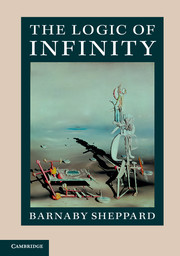Book contents
- Frontmatter
- Contents
- Preface
- Synopsis
- 1 Introduction
- 2 Logical foundations
- 3 Avoiding Russell's paradox
- 4 Further axioms
- 5 Relations and order
- 6 Ordinal numbers and the Axiom of Infinity
- 7 Infinite arithmetic
- 8 Cardinal numbers
- 9 The Axiom of Choice and the Continuum Hypothesis
- 10 Models
- 11 From Gödel to Cohen
- A Peano Arithmetic
- B Zermelo–Fraenkel set theory
- C Gödel's Incompleteness Theorems
- Bibliography
- Index
- Frontmatter
- Contents
- Preface
- Synopsis
- 1 Introduction
- 2 Logical foundations
- 3 Avoiding Russell's paradox
- 4 Further axioms
- 5 Relations and order
- 6 Ordinal numbers and the Axiom of Infinity
- 7 Infinite arithmetic
- 8 Cardinal numbers
- 9 The Axiom of Choice and the Continuum Hypothesis
- 10 Models
- 11 From Gödel to Cohen
- A Peano Arithmetic
- B Zermelo–Fraenkel set theory
- C Gödel's Incompleteness Theorems
- Bibliography
- Index
Summary
Proof is the idol before whom the pure mathematician tortures himself.
–Sir Arthur EddingtonThe vast majority of all humanly describable logical truths are, if presented without adequate preparation, either counterintuitive or beyond intuitive judgement. This is not a feature of an inherently peculiar Universe but merely a reminder of our limited cognitive ability; we have a thin grasp of large abstract structures. Fortunately we can gain access to the far reaches of such alien territory by building long strings of logical inferences, developing a new intuition as we do so. A proof of a theorem describes one such path through the darkness. Another important aspect of mathematics more closely resembles the empirical sciences, where features of a mathematical landscape are revealed experimentally, through the design of algorithms and meta-algorithms. In this book I assemble a miniature collage of a part of mathematics; an initial fragment of a huge body of work known as axiomatic set theory. The ambition of the book is a humble one – my intention is simply to present a snapshot of some of the basic themes and ideas of the theory.
Despite the impression given by the impatient practices of the media, it is not possible to faithfully condense into one convenient soundbite the details of any significant idea. One cannot hope to explain the rules of chess in six syllables, and it would be equally absurd to expect a short accessible account of set theory to be anything more than a fleeting glimpse of the whole.
- Type
- Chapter
- Information
- The Logic of Infinity , pp. xvii - xxivPublisher: Cambridge University PressPrint publication year: 2014



